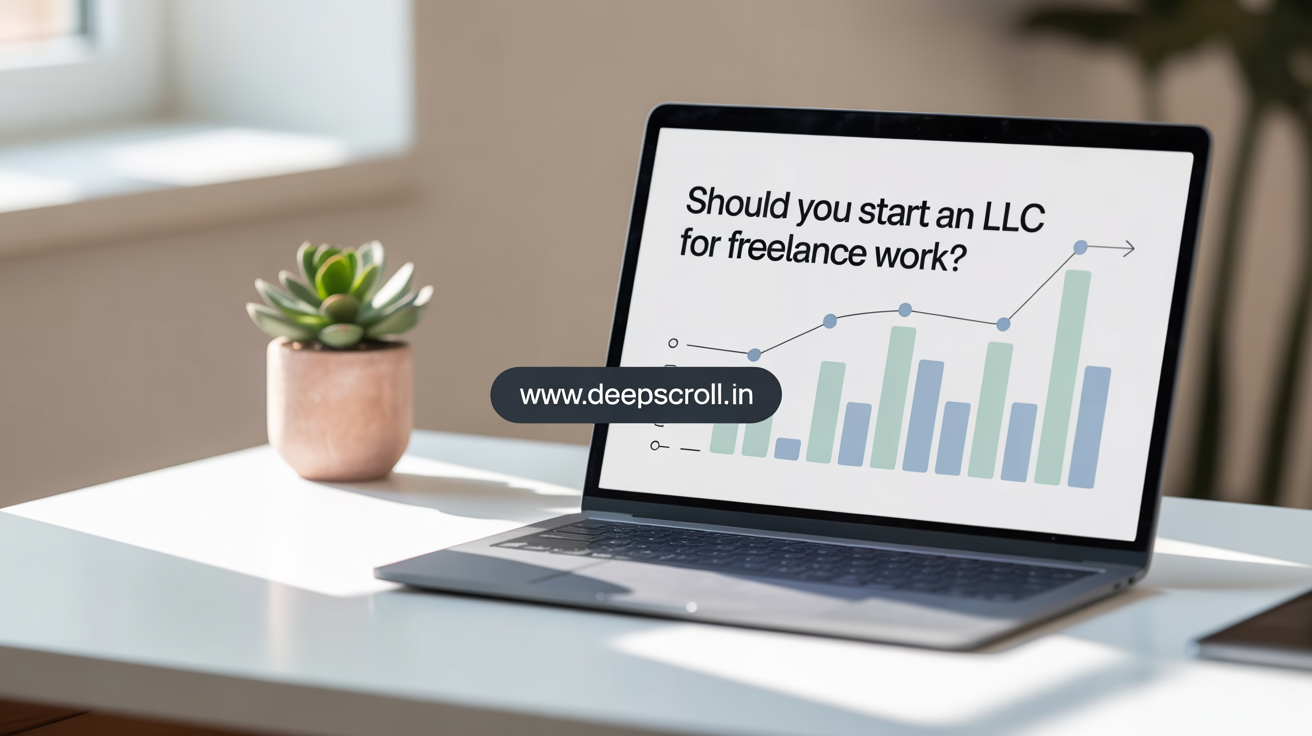
Should you start an LLC for freelance work?
Freelancing is booming among Millennials and Gen Zs seeking independence and extra income, especially with today’s flexible online work culture. But when it comes to managing your money, protecting yourself legally, and building long-term wealth, one question looms: should you set up an LLC for your freelance business? Whether you’re a creator juggling gigs, part of a young couple saving for the future, or paying down debt on variable income, understanding this decision could impact your financial life. In this guide, we’ll break down the pros, cons, and real-life implications of forming an LLC as a freelancer—so you can decide what’s best for your budget, brand, and peace of mind.
What is an LLC and why do freelancers consider it?
An LLC (Limited Liability Company) is a legal business structure that separates your personal assets from your business responsibilities. For freelancers and solo creators, this means if your business is ever sued or goes into debt, your savings, home, and car are much safer than if you operate as a sole proprietor. Millennials and Gen Zs with student loans or young families often look at LLCs to:
- Reduce personal risk: Separate your finances and limit liability if something goes wrong.
- Build credibility: An LLC can make you look more professional to brands, clients, and banks.
- Unlock business banking: With an LLC, you can open dedicated business accounts and access certain tax deductions.
But creating an LLC has costs—registration fees, annual filings, and possible state taxes. Understanding whether the protection is worth it for your income level and stability is key. For a deeper dive, NerdWallet’s guide offers details on LLC basics and state-by-state differences.
Pros and cons of starting an LLC for freelance work
| Pros | Cons |
|---|---|
|
|
Having an LLC isn’t mandatory for most online creative and freelance gigs. However, if your income is rising, or you’re handling higher-value contracts, client lawsuits, or hiring help, the protections and tax perks often make financial sense, especially as you grow. See the IRS page for LLC tax information.
Who benefits most from forming an LLC?
Before jumping in, weigh your unique situation. If you’re early in your freelance journey, just getting your first clients, and your income is unpredictable or low, it may make sense to hold off—focus on building your portfolio and keeping overhead minimal. However, you may want to consider an LLC if:
- Your annual freelance income regularly exceeds $25,000
- You’re signing contracts with brands or companies
- You have or plan to hire subcontractors or employees
- Your work involves advice, consulting, or creative deliverables that could trigger disputes
- You want to attract bigger clients that require a business entity
For young couples and parents, having an LLC can also make estate or legacy planning easier—and can even help with childcare tax deductions in some cases.
Money and tax implications
An LLC can change your tax life in several ways. Compared to simply being a sole proprietor, an LLC lets you:
- Deduct more business expenses (studio rent, software, travel, etc.)
- Decide how you want to be taxed: as yourself, or as an S-corp (which may offer savings as you grow)
- Set up separate business credit and bank accounts, which improves your budgeting and savings discipline
However, with increased control and potential savings comes extra paperwork. States like California and New York, often favored by creators, have high LLC fees and taxes. On the flip side, some states like Wyoming and Delaware are more business-friendly. It’s smart to use a service like Stripe Atlas or LegalZoom to simplify the process, especially if you want to ‘hack’ the system for the lowest fees and fastest setup.
Quick cost comparison table
| Structure | Setup cost (avg.) | Annual maintenance | Tax flexibility |
|---|---|---|---|
| Sole proprietorship | $0-$60 | Minimal | Low |
| LLC (basic) | $50-$500 | $50-$800+ | Medium/High |
| LLC (S-corp taxed) | $100-$500+ | $175-$1,000+ | Highest |
Smarter financial moves for new freelancers
Forming an LLC isn’t just about taxes or liability. It’s a mindset shift—treating your freelance hustle like a real business, with systems, boundaries, and growth potential. Millennials and Gen Zs chasing financial freedom can leverage an LLC to:
- Keep business and personal money separate, making budgeting and debt payments easier
- Write off gear, home office expenses, and even part of your utilities
- Position yourself for future passive income streams, like digital products or hiring contractors
- Sleep better knowing one bad client can’t tank your personal savings
Still, don’t let “what ifs” stop your momentum. If an LLC feels overwhelming, start small as a sole proprietor, but stay organized (track income/expenses in a spreadsheet or app). When your income and risks grow, revisit the LLC option—it’ll be easier with good records and habits already in place.
Conclusion: Is an LLC the right choice for your freelance path?
For many new freelancers and creators, starting as a sole proprietor keeps things simple and costs down. But if you aim to scale your business, want solid legal protection, or crave peace of mind managing variable income, forming an LLC could set you up for bigger financial wins. Weigh the costs and benefits for your situation, and remember—how you treat your side hustle shapes its future. Do your research, use budgeting tools, and don’t be afraid to level up when your work becomes a true business.
“An investment in knowledge always pays the best interest.” – Benjamin Franklin
